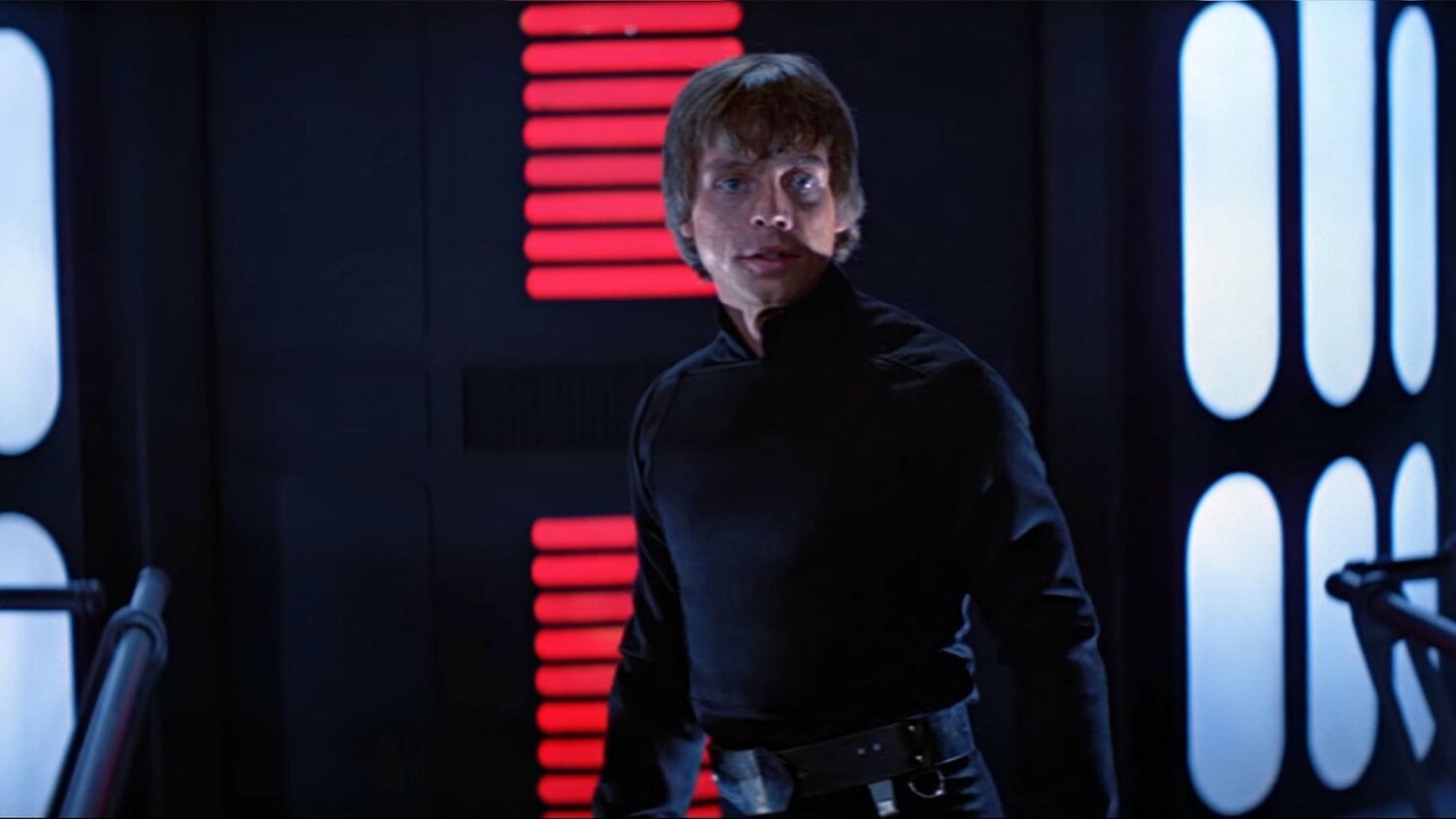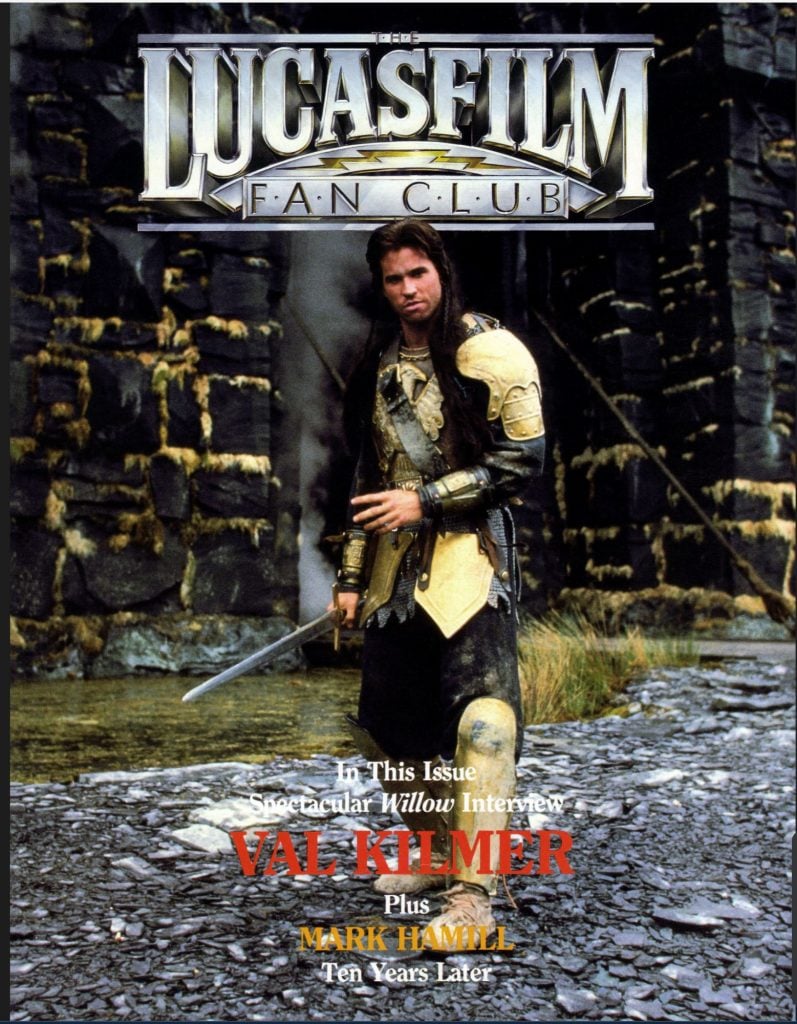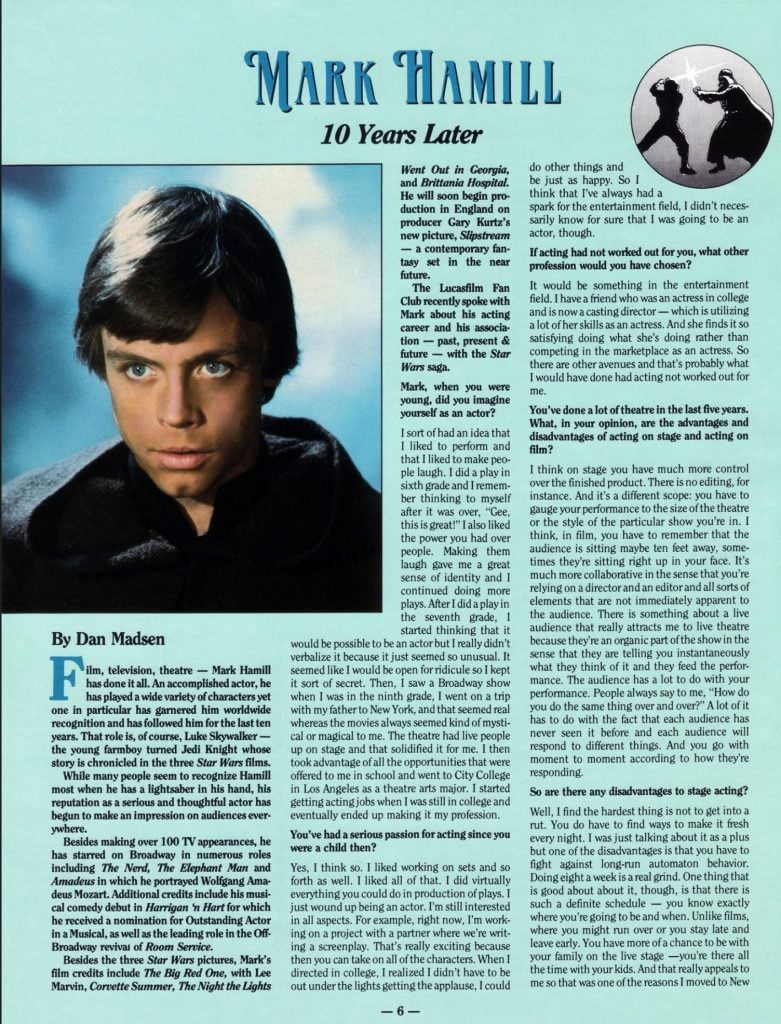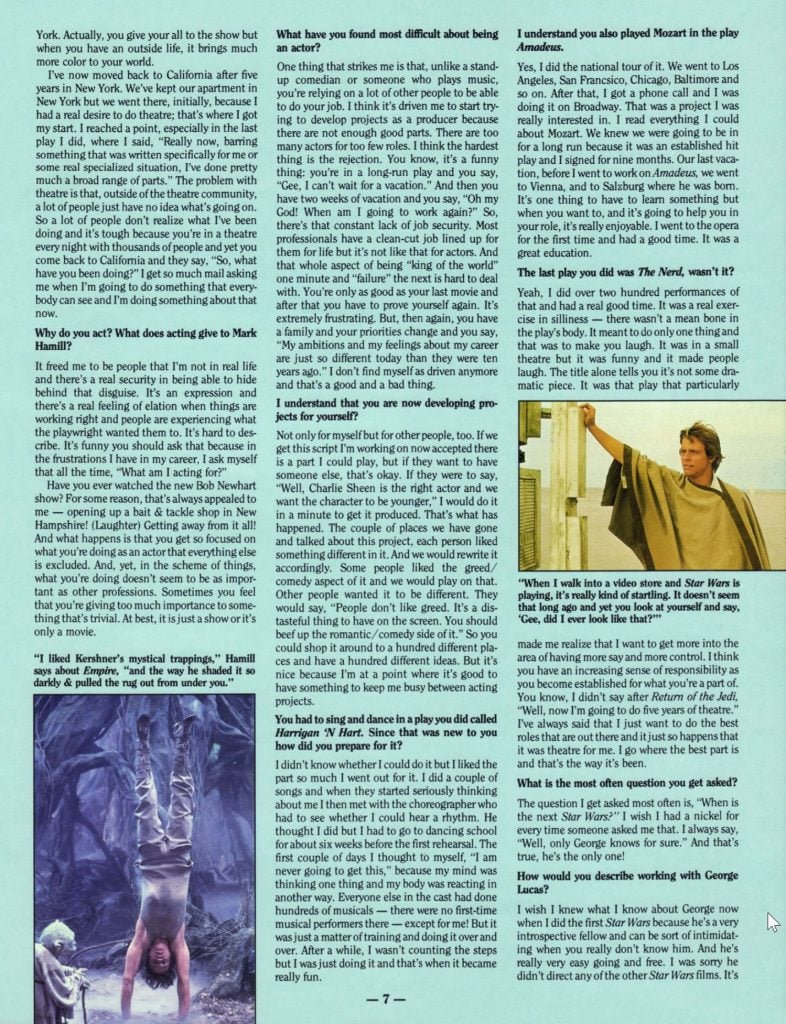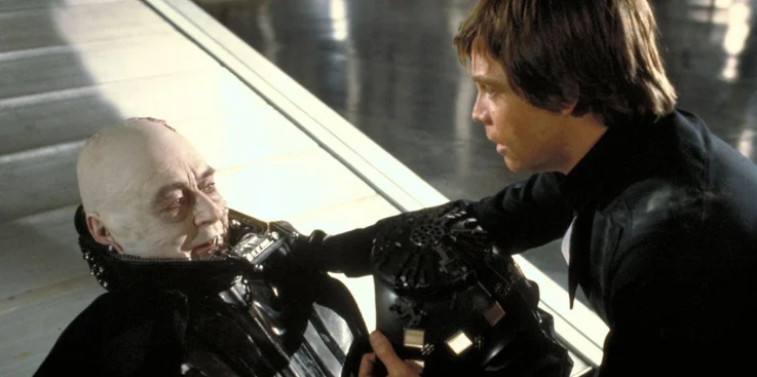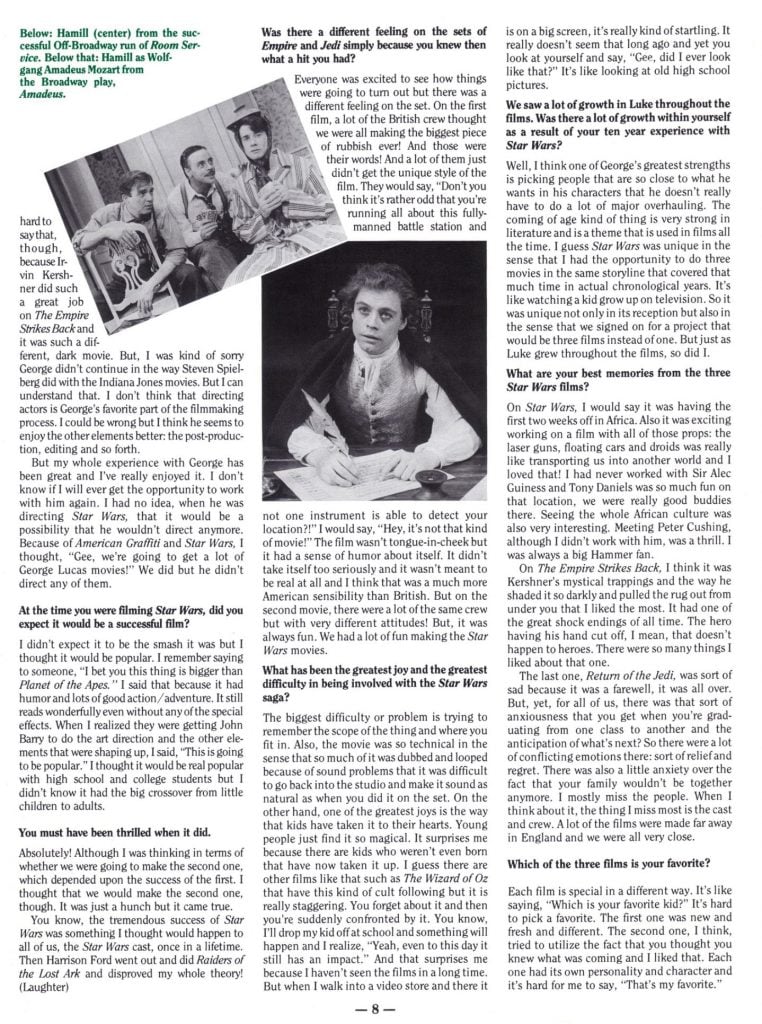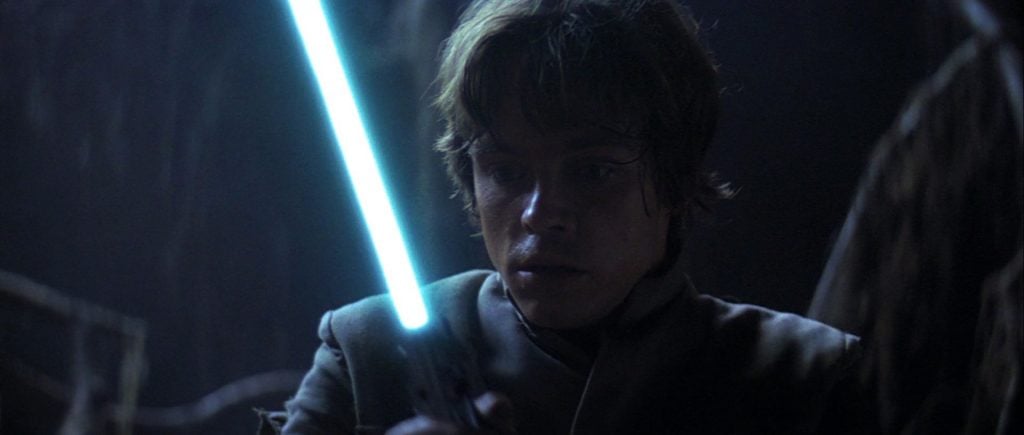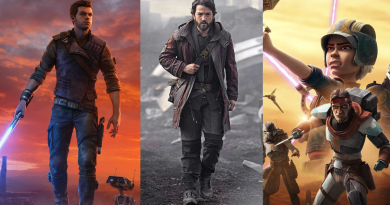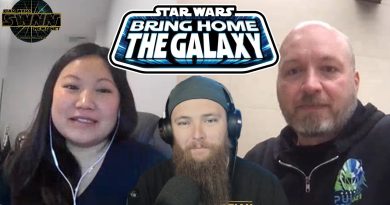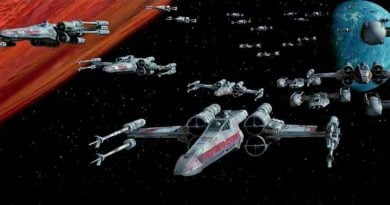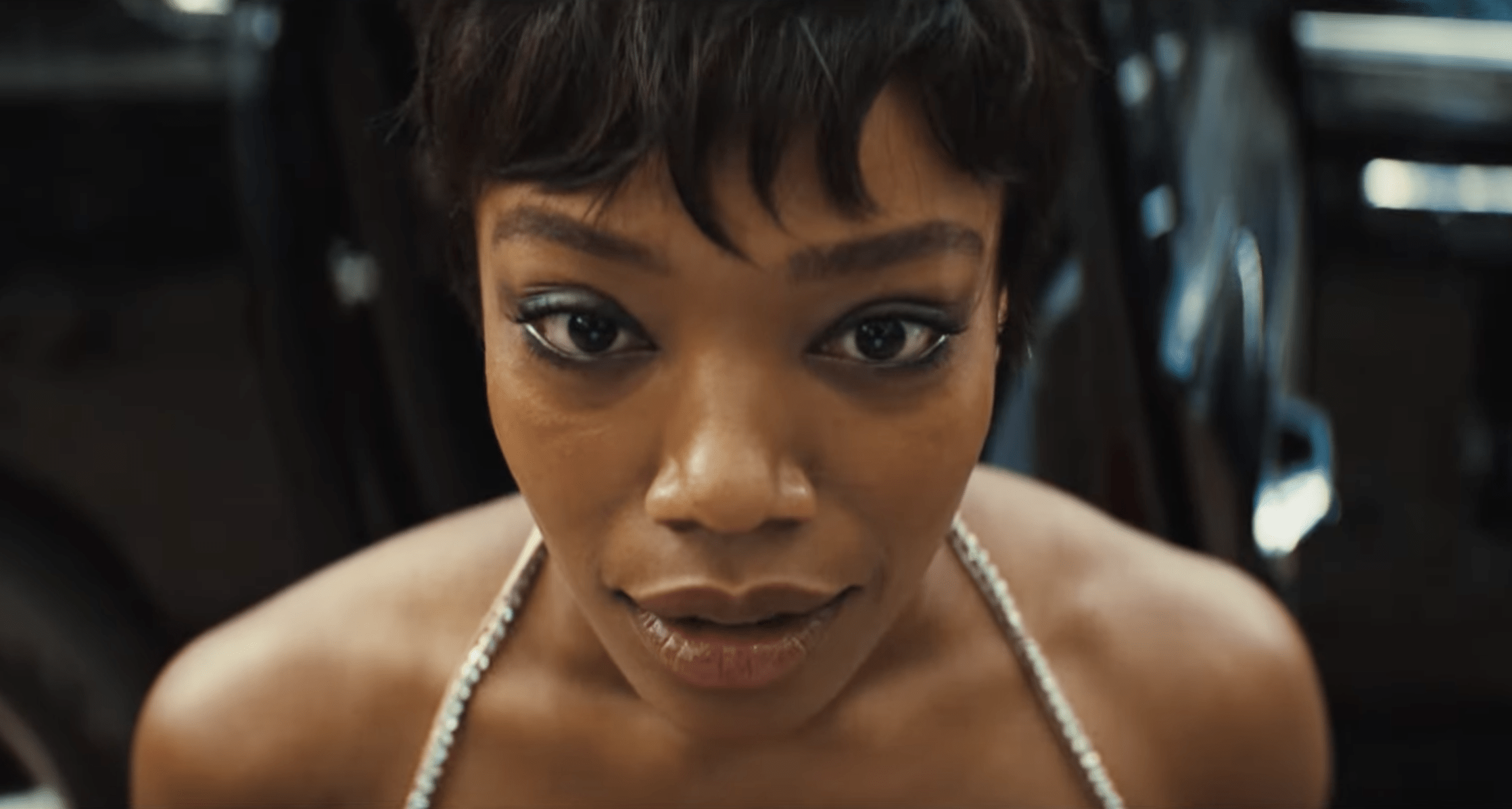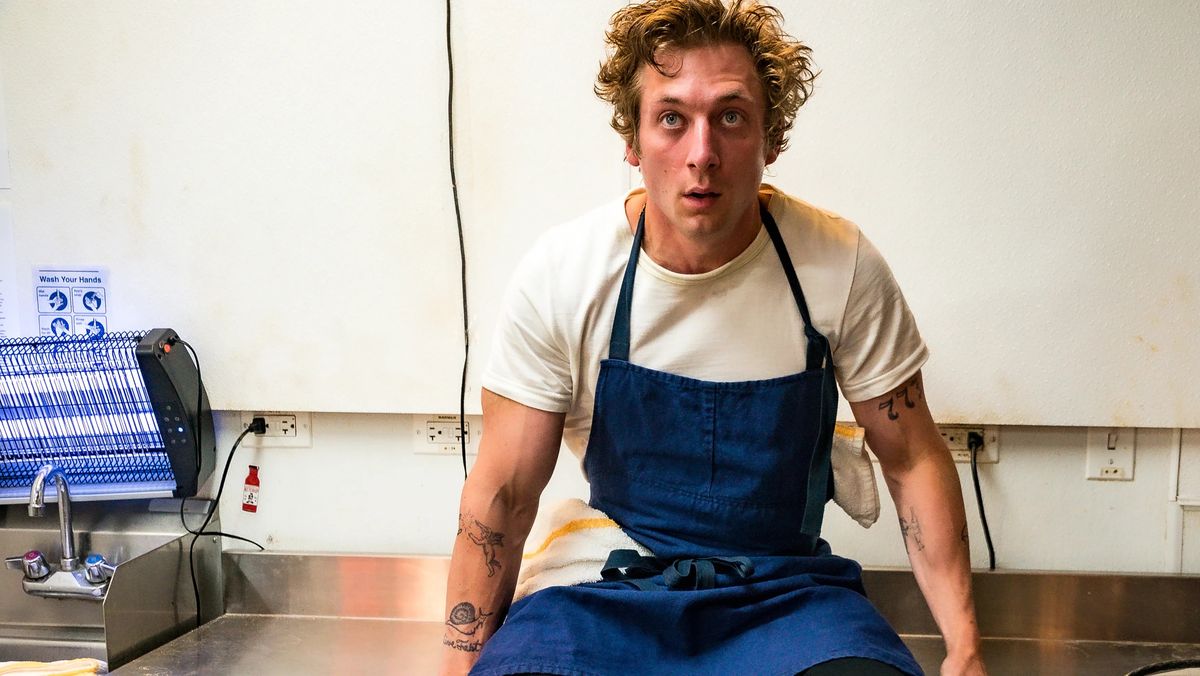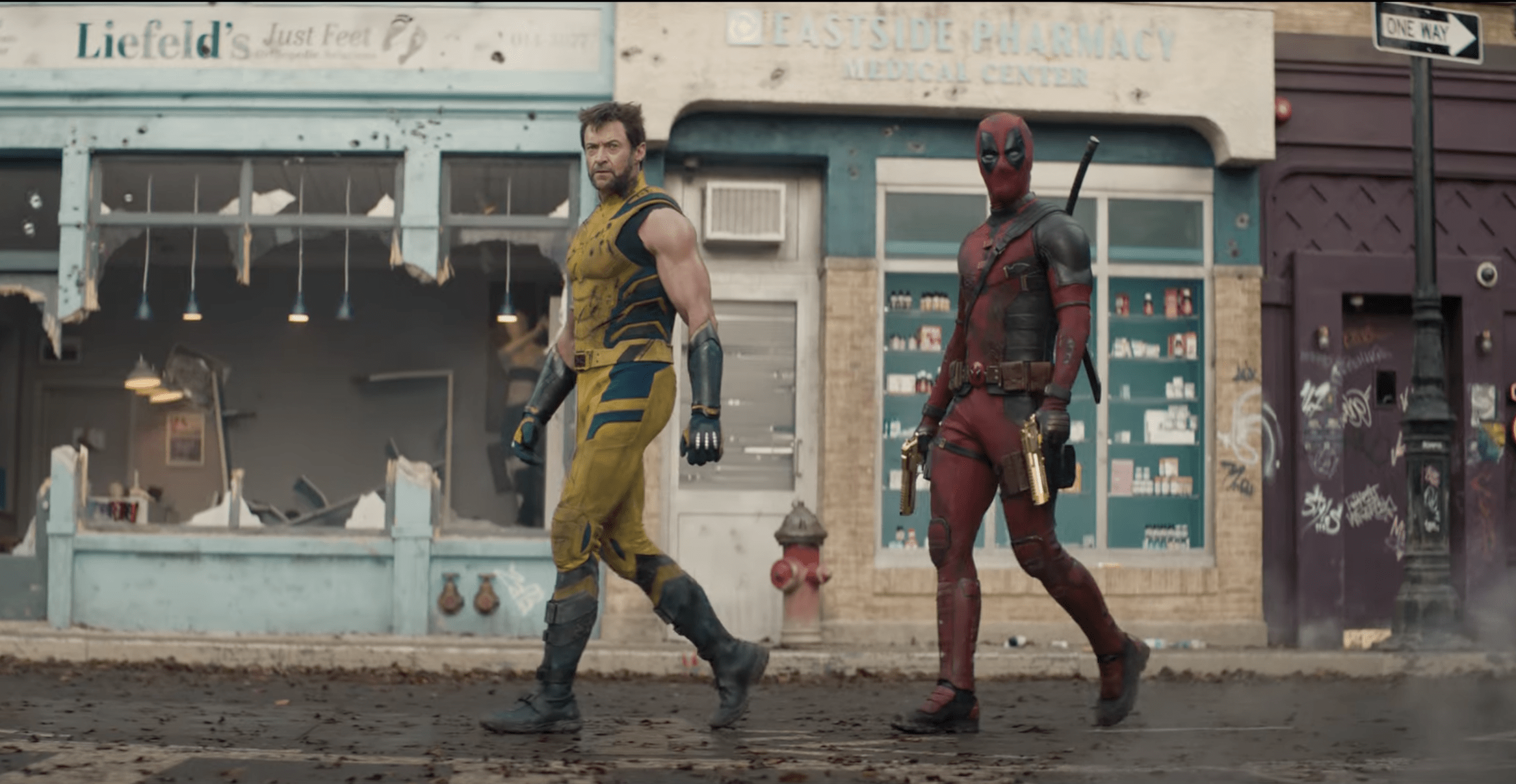Mark Hamill Interview (1988) from the ‘Lucasfilm Fan Club’ Issue #3 – 10 Years Later
Much like the Anthony Daniels interview we shared a few days ago, this Mark Hamill one from the Lucasfilm Fan Club Magazine #3 (1988) has some interesting insights into the making of the original Star Wars trilogy and the actor’s personal experiences.
I have copied the text out of the images so it’s easier to read for you all, but we are only sharing the interview as it was published, and all credit is to the Lucasfilm Fan Club and its interviewers.
Mark Hamill 10 Years Later, by Dan Madsen
Film, television, theatre – Mark Hamill has done it all. An accomplished actor, he has played a wide variety of characters yet one in particular has garnered him worldwide recognition and has followed him for the last ten years. That role is, of course, Luke Skywalker – the young farmboy turned Jedi Knight whose story is chronicled in the three Star Wars films. While many people seem to recognize Hamill most when he has a lightsaber in his hand, his reputation as a serious and thoughtful actor has begun to make an impression on audiences everywhere.
Besides making over 100 TV appearances, he has starred on Broadway in numerous roles including The Nerd, The Elephant Man and Amadeus in which he portrayed Wolfgang Amadeus Mozart. Additional credits include his musical comedy debut in Harrigan ‘n Hart for which he received a nomination for Outstanding Actor in a Musical, as well as the leading role in the Off-Broadway revival of Room Service. Besides the three Star Wars pictures, Mark’s film credits include The Big Red One, with Lee Marvin, Corvette Summer, The Night the Lights Went Out in Georgia, and Britannia Hospital. He will soon begin production in England on producer Gary Kurtz’s new picture, Slipstream a contemporary fantasy set in the near future.
The Lucasfilm Fan Club recently spoke with Mark about his acting career and his association – past, present & future – with the Star Wars saga.
Mark, when you were young, did you imagine yourself as an actor?
I sort of had an idea that I liked to perform and that I liked to make people laugh. I did a play in sixth grade, and I remember thinking to myself after it was over, “Gee, this is great!” I also liked the power you had over people. Making them laugh gave me a great sense of identity and I continued doing more plays. After I did a play in the seventh grade, I started thinking that it would be possible to be an actor but I really didn’t verbalize it because it just seemed so unusual.
It seemed like I would be open for ridicule, so I kept it sort of secret. Then, I saw a Broadway show when I was in the ninth grade, I went on a trip with my father to New York, and that seemed real whereas the movies always seemed kind of mystical or magical to me. The theatre had live people up on stage and that solidified it for me. I then took advantage of all the opportunities that were offered to me in school and went to City College in Los Angeles as a theatre arts major. I started getting acting jobs when I was still in college and eventually ended up making it my profession.
You’ve had a serious passion for acting since you were a child then?
Yes, I think so. I liked working on sets and so forth as well. I liked all of that. I did virtually everything you could do in production of plays. I just wound up being an actor. I’m still interested in all aspects. For example, right now, I’m working on a project with a partner where we’re writing a screenplay. That’s really exciting because then you can take on all of the characters.
When I directed in college, I realized I didn’t have to be out under the lights getting the applause, I could do other things and be just as happy. So I think that I’ve always had a spark for the entertainment field, I didn’t necessarily know for sure that I was going to be an actor, though.
If acting had not worked out for you, what other profession would you have chosen?
It would be something in the entertainment field. I have a friend who was an actress in college and is now a casting director – which is utilizing a lot of her skills as an actress. And she finds it so satisfying doing what she’s doing rather than competing in the marketplace as an actress.
So there are other avenues and that’s probably what I would have done had acting not worked out for me.
You’ve done a lot of theatre in the last five years.
What, in your opinion, are the advantages and disadvantages of acting on stage and acting on film?
I think on stage you have much more control over the finished product. There is no editing, for instance. And it’s a different scope: you have to gauge your performance to the size of the theatre or the style of the particular show you’re in. I think, in film, you have to remember that the audience is sitting maybe ten feet away, sometimes they’re sitting right up in your face. It’s much more collaborative in the sense that you’re relying on a director and an editor and all sorts of elements that are not immediately apparent to the audience.
There is something about a live audience that really attracts me to live theatre because they’re an organic part of the show in the sense that they are telling you instantaneously what they think of it and they feed the performance. The audience has a lot to do with your performance. People always say to me, “How do vou do the same thing over and over?” A lot of it has to do with the fact that each audience has never seen it before and each audience will respond to different things. And you go with moment to moment according to how they’re responding.
So are there any disadvantages to stage acting?
Well, I find the hardest thing is not to get into a rut. You do have to find ways to make it fresh every night. I was just talking about it as a plus but one of the disadvantages is that you have to fight against long-run automaton behaviour. Doing eight a week is a real grind. One thing that is good about it, though, is that there is such a definite schedule – you know exactly where you’re going to be and when. Unlike films, where you might run over or you stay late and leave early.
You have more of a chance to be with your family on the live stage -you’re there all the time with your kids. And that really appeals to me so that was one of the reasons I moved to New York. Actually, you give your all to the show but when you have an outside life, it brings much more color to your world.
I’ve now moved back to California after five years in New York. We’ve kept our apartment in New York but we went there, initially, because I had a real desire to do theatre; that’s where I got my start. I reached a point, especially in the last play I did, where I said, “Really now, barring something that was written specifically for me or some real specialized situation, I’ve done pretty much a broad range of parts.” The problem with theatre is that, outside of the theatre community, a lot of people just have no idea what’s going on.
So a lot of people don’t realize what I’ve been doing and it’s tough because you’re in a theatre every night with thousands of people and yet you come back to California and they say, “So, what have you been doing?” I get so much mail asking me when I’m going to do something that everybody can see and I’m doing something about that now.
Why do you act? What does acting give to Mark Hamill?
It freed me to be people that I’m not in real life and there’s a real security in being able to hide behind that disguise. It’s an expression and there’s a real feeling of elation when things are working right and people are experiencing what the playwright wanted them to. It’s hard to describe. It’s funny you should ask that because in the frustrations I have in my career, I ask myself that all the time, “What am I acting for?”
Have you ever watched the new Bob Newhart show? For some reason, that’s always appealed to me – opening up a bait & tackle shop in New Hampshire! (Laughter) Getting away from it all!
And what happens is that you get so focused on what you’re doing as an actor that everything else is excluded. And, yet, in the scheme of things, what you’re doing doesn’t seem to be as important as other professions. Sometimes you feel that you’re giving too much importance to something that’s trivial. At best, it is just a show or it’s only a movie.
What have you found most difficult about being an actor?
One thing that strikes me is that, unlike a standup comedian or someone who plays music, you’re relying on a lot of other people to be able to do your job. I think it’s driven me to start trying to develop projects as a producer because there are not enough good parts. There are too many actors for too few roles. I think the hardest thing is the rejection. You know, it’s a funny thing: you’re in a long-run play and you say, “Gee, I can’t wait for a vacation.”
And then you have two weeks of vacation and you say, “Oh my God! When am I going to work again?” So, there’s that constant lack of job security. Most professionals have a clean-cut job lined up for them for life but it’s not like that for actors. And that whole aspect of being “king of the world” one minute and “failure” the next is hard to deal with. You’re only as good as your last movie and after that you have to prove yourself again. It’s extremely frustrating. But, then again, you have a family and your priorities change and you say, “My ambitions and my feelings about my career are just so different today than they were ten years ago.” I don’t find myself as driven anymore and that’s a good and a bad thing.
I understand that you are now developing projects for yourself?
Not only for myself but for other people, too. If we get this script I’m working on now accepted there is a part I could play, but if they want to have someone else, that’s okay. If they were to say, “Well, Charlie Sheen is the right actor and we want the character to be younger,” I would do it in a minute to get it produced. That’s what has happened. The couple of places we have gone and talked about this project, each person liked something different in it. And we would rewrite it accordingly. Some people liked the greed/ comedy aspect of it and we would play on that.
Other people wanted it to be different. They would say, “People don’t like greed. It’s a distasteful thing to have on the screen. You should beef up the romantic/comedy side of it.” So you could shop it around to a hundred different places and have a hundred different ideas. But it’s nice because I’m at a point where it’s good to have something to keep me busy between acting projects.
You had to sing and dance in a play you did called Harrigan ‘N Hart. Since that was new to you how did you prepare for it?
I didn’t know whether I could do it but I liked the part so much I went out for it. I did a couple of songs and when they started seriously thinking about me I then met with the choreographer who had to see whether I could hear a rhythm. He thought I did but I had to go to dancing school for about six weeks before the first rehearsal. The first couple of days I thought to myself, “I am never going to get this,” because my mind was thinking one thing and my body was reacting in another way.
Everyone else in the cast had done hundreds of musicals – there were no first-time musical performers there – except for me! But it was just a matter of training and doing it over and over. After a while, I wasn’t counting the steps but I was just doing it and that’s when it became really fun.
I understand you also played Mozart in the play Amadeus.
Yes, I did the national tour of it. We went to Los Angeles, San Francisco, Chicago, Baltimore and so on. After that, I got a phone call and I was doing it on Broadway. That was a project I was really interested in. I read everything I could about Mozart. We knew we were going to be in for a long run because it was an established hit play and I signed for nine months. Our last vacation, before I went to work on Amadeus, we went to Vienna, and to Salzburg where he was born.
It’s one thing to have to learn something but when you want to, and it’s going to help you in your role, it’s really enjoyable. I went to the opera for the first time and had a good time. It was a great education.
The last play you did was The Nerd, wasn’t it?
Yeah, I did over two hundred performances of that and had a real good time. It was a real exercise in silliness – there wasn’t a mean bone in the play’s body. It meant to do only one thing and that was to make you laugh. It was in a small theatre but it was funny and it made people laugh. The title alone tells you it’s not some dramatic piece. It was that play that particularly made me realize that I want to get more into the area of having more say and more control. I think you have an increasing sense of responsibility as you become established for what you’re a part of.
You know, I didn’t say after Return of the Jedi, “Well, now I’m going to do five years of theatre.” I’ve always said that I just want to do the best roles that are out there and it just so happens that it was theatre for me. I go where the best part is and that’s the way it’s been.
What is the most often question you get asked?
The question I get asked most often is, “When is the next Star Wars?” I wish I had a nickel for every time someone asked me that. I always say, “Well, only George knows for sure.” And that’s true, he’s the only one!
How would you describe working with George Lucas?
I wish I knew what I know about George now when I did the first Star Wars because he’s a very introspective fellow and can be sort of intimidating when you really don’t know him. And he’s really very easy going and free. I was sorry he didn’t direct any of the other Star Wars films. It’s hard to say that, though, because Irvin Kirshner did such a great job on The Empire Strikes Back and it was such a different, dark movie.
But, I was kind of sorry George didn’t continue in the way Steven Spielberg did with the Indiana Jones movies. But I can understand that.
I don’t think that directing actors is George’s favourite part of the filmmaking process. I could be wrong, but I think he seems to enjoy the other elements better: the post-production, editing and so forth.
But my whole experience with George has been great and I’ve really enjoyed it. I don’t know if I will ever get the opportunity to work with him again. I had no idea, when he was directing Star Wars, that it would be a possibility that he wouldn’t direct anymore.
Because of American Graffiti and Star Wars, I thought, “Gee, we’re going to get a lot of George Lucas movies!” We did but he didn’t direct any of them.
At the time you were filming Star Wars, did you expect it would be a successful film?
I didn’t expect it to be the smash it was but I thought it would be popular. I remember saying to someone, “I bet you this thing is bigger than Planet of the Apes.” I said that because it humor and lots of good action/ adventure. It still reads wonderfully even without any of the special – effects.
When I realized they were getting John Barry to do the art direction and the other elements that were shaping up, I said, “This is going to be popular.” I thought it would be real popular with high school and college students but I didn’t know it had the big crossover from little children to adults.
You must have been thrilled when it did.
Absolutely! Although I was thinking in terms of whether we were going to make the second one, which depended upon the success of the first. I thought that we would make the second one, though. It was just a hunch but it came true.
You know, the tremendous success of Star Wars was something I thought would happen to all of us, the Star Wars cast, once in a lifetime. Then Harrison Ford went out and did Raiders of the Lost Ark and disproved my whole theory! (Laughter)
Was here a different feeling on the sets of Empire and Jedi simply because you knew then what a hit you had?
Everyone was excited to see how things were going to turn out but there was a different feeling on the set. On the first film, a lot of the British crew thought yourself we were all making the biggest piece of rubbish ever! And those were their words! And a lot of them just didn’t get the unique style of the film.
They would say, “Don’t you rather odd that you’re running all about this fully manned battle station and not one instrument is able to detect your location?!” I would say, “Hey, it’s not that kind of movie!” The film wasn’t tongue-in-cheek but it had a sense of humor about itself. It didn’t take itself too seriously and it wasn’t meant to be real at all and I think that was a much more American sensibility than British. But on the second movie, there were a lot of the same crew but with very different attitudes! But, it was always fun. We had a lot of fun making the Star Wars movies.
What has been the greatest joy and the greatest had difficulty in being involved with the Star Wars saga?
The biggest difficulty or problem is trying to remember the scope of the thing and where you fit in. Also, the movie was so technical in the sense that so much of it was dubbed and looped because of sound problems that it was difficult to go back into the studio and make it sound as natural as when you did it on the set.
On the other hand, one of the greatest joys is the way that kids have taken it to their hearts. Young people just find it so magical. It surprises me because there are kids who weren’t even born other films like that such as The Wizard of Oz that have this kind of cult following but it is really staggering.
You forget about it and then you’re suddenly confronted by it. You know, I’ll drop my kid off at school and something will happen and I realize, “Yeah, even to this day still has an impact.” And that surprises me because I haven’t seen the films in a long time. But when I walk into a video store and there it is on a big screen, it’s really kind of startling. It really doesn’t seem that long ago and yet you look at yourself and say, “Gee, did I ever look like that?” It’s like looking at old high school pictures.
We saw a lot of growth in Luke throughout the films. Was there a lot of growth within as a result of your ten year experience with Star Wars?
Well, I think one of George’s greatest strengths is picking people that are so close to what he wants in his characters that he doesn’t really think it had to do a lot of major overhauling. The coming of age kind of thing is very strong in literature and is a theme that is used in films all the time.
I guess Star Wars was unique in the sense that I had the opportunity to do three movies in the same storyline that covered that much time in actual chronological years.
It’s like watching a kid grow up on television.
So it was unique not only in its reception but also in the sense that we signed on for a project that would be three films instead of one.
But just as Luke grew throughout the films, so did I.
What are your best memories from the three Star Wars films?
On Star Wars, I would say it was having the first two weeks off in Africa. Also it was exciting working on a film with all of those props: the laser guns, floating cars and droids was really like transporting us into another world and I loved that! I had never worked with Sir Alec Guinness and Tony Daniels was so much fun on that location, we were really good buddies there.
Seeing the whole African culture was also very interesting. Meeting Peter Cushing, although I didn’t work with him, was a thrill. I was always a big Hammer fan.
On The Empire Strikes Back, I think it was Kershner’s mystical trappings and the way he shaded it so darkly and pulled the rug out from under you that I liked the most. It had one of the great shock endings of all time. The hero having his hand cut off, I mean, that doesn’t happen to heroes. There were so many things I liked about that one.
The last one, Return of the Jedi, was sort of sad because it was a farewell, it was all over. But, yet, for all of us, there was that sort of anxiousness that you get when you’re graduating from one class to another and the anticipation of what’s next? So there were a lot of conflicting emotions
there: sort of relief and regret. There was also a little anxiety over the fact that your family wouldn’t be together anymore. I mostly miss the people. When I think about it, the thing I miss most is the cast and crew. A lot of the films were made far away in England and we were all very close.
Which of the three films is your favorite?
Each film is special in a different way. It’s like saying, “Which is your favorite kid?” It’s hard to pick a favorite. The first one was new and fresh and different. The second one, I think, it tried to utilize the fact that you thought you knew what was coming and I liked that. Each one had its own personality and character and it it’s hard for me to say, “That’s my favorite.”
Do you enjoy the science fiction genre?
Oh, yeah! I have enjoyed it very much before and after Star Wars. My new film, Slipstream, falls into that category. People say to me, “I guess you don’t want to do science fiction again,” and that’s not true. First of all, I thought Star Wars was really more of a fantasy than science fiction. It was a fairytale in outer space. It was a far cry from a film like The Fly or Aliens or something like that.
You play a villain in your new film, Slipstream, don’t you?
Yeah, in a sense. What happens is that you get into your character and you don’t think of yourself as a bad guy. But, I am playing a guy that’s not too nice. That’s another thing I’ve been waiting for. I’ve always said, “When is somebody going to take the chance to cast me as a villain in a film?” They’ve been much more brave with me in theatre than they have in movies.
My problem was that I was still getting offered “youth” films and “coming of age” films after Jedi, which was silly. I had been looking since 1977 for someone who would be willing to take a chance.
When people see me come on the screen they shouldn’t say, “Oh, here comes the good guy.” And the director of Slipstream, Steven Lisberger, is the first person who’s thought the very same thing.
If George Lucas continues the Star Wars films do you feel they can maintain the quality and inventiveness of the first three?
Oh, George can do anything! There is so much unused material that didn’t get into the first three that I’m sure he can do a terrific job with it.
I’m sure there are some fans who will miss Luke, Han and Lei since they are not supposed to be in the next three films.
Well, that’s very flattering. A lot of people who are up on Star Wars and know that we’re not going to be in the next films say, “Oh, we’re going to miss Luke, Han and Leia.” But that must be the real challenge for George: coming up with new characters and new situations.
There’s a whole world, and a whole universe out there for him to play with. But I can tell you without any hesitation, I’ll go see the next films!
If and when George gets to the last three films of the saga, would you be interested in coming back to portray Luke at an older age?
I’ve always found it comforting to have a job lined up at the turn of the century! (Laughter) I would do anything for George. It’s hard for me to say “yes” right now because that’s such a long time from now. You know, I’ll show up there, I’ll be 62 years old and I’ll be the new Obi-Wan Kenobi! Actors are a suspicious lot.
We’re all sort of “Doubting Thomas'” so I always say, “Sure, maybe.” When I sign for it, then I’ll be doing it. I don’t take anything for granted. I’ve had so many films fall apart for the most crazy reasons in the world.
I’ve read at times that I don’t like my Luke Skywalker image or my connection with the Star Wars films and that is so untrue. Naturally, I don’t want to be a “Johnny One Note” and be that for the rest of my life but, so I far, I don’t think I have been. Every part I’ve played since Star Wars has been so different that I guess it doesn’t bother me as some of the people in the media think it must. If that’s the impression people get then it’s all wrong. I love those films and owe a lot to them, so if anyone detects a sort of reservation in me for not wanting to commit to saying “yes” to doing the last three films, which are so far in the future, it’s only because of other reasons, it has nothing to do with the project itself.
What has been your greatest accomplishment been waiting for. I’ve always said, “When is so far?
I think my family would be the most important in my career, I really liked the TV series I did called The Texas Wheelers because it broke a lot of rules. There was never any laugh track. It never gets mentioned anymore. You know, there are still those shows that claim they’re the first show without a laugh track but how quickly they forget. It was also a really great character for me. I got to do a lot of really funny things. I was a cocky, young kid making mistakes in life. I served sort of the same function as Ted Baxter did on the Mary Tyler, Moore show. I always got things wrong, I was a liar and I was kind of full of myself. It was a real good character to play. I also have to say that I enjoyed doing Amadeus very much. I worked with a lot of talented people on that show. Those were maybe the highlights for me.
Did the fame and recognition of Star Wars change your life?
Yeah, but it came in stages because I was starting to do other roles at the same time: I was on a soap opera and some other things. Usually, you start becoming a public figure and you can adjust to it slowly but Star Wars was enormous. It was also sort of gradual, though. It’s like getting used to the water, putting your toes in. I worked a lot before the Star Wars films came along. I have over 100 television credits, 5 TV movies and 9 months on a soap opera. I had a lot of exposure but maybe in a more limited fashion. George Lucas told me that any number of TV movies will be seen by a lot more people than actually go out to the theater and see his films or any films for that matter. Television is so pervasive – it’s everywhere!
Does Star Wars still affect your life today?
I guess to a certain extent it does because you become a little more cautious. I forget that people might be noticing me because of my role in Star Wars. That’s not something that’s on my mind when I’m walking the streets but it’s always there. For instance, just last night, I went to pick up my wife at the airport and her plane was late and I had to park and go in the terminal. And I was amazed! I’m out of costume, out of character and I couldn’t believe how many people said “hello” or asked me to sign an autograph and so forth. It’s sometimes strange because I’m Mark Hamill in everyday life just picking up my wife at the airport – I’m not making a personal appearance.
So you can’t help but change your attitudes but it’s never really been a bad problem. It’s usually fun. You become a little self-conscious, though, because Luke Sky-walker was larger than life and spectacularly lit in every scene and sometimes people expect you to be like that. And I’m not like that. I’m not very tall and I’m not a bronze, glowing God!
When people see those movies, they’re seeing Luke, not me. I can’t say, “Gee, aren’t I brave! Aren’t I spectacular!” I’m just an actor playing a part and I can step out of it…I hope. But it’s a good character to be associated with and I’m very pleased about that.
Mark, thank you for the interview.
Thank you, I’ve enjoyed it very much.
Alexander has been a lifelong Star Wars fan having started watching with his elder brother in the early 80's through to watching The Phantom Menace with same brother in cinema as a 21 year old with beer.
His love for the franchise has never waned.
A published comic book writer and letterer but when not watching or reading Star Wars is usually hacking computers for work.
Follow on twitter @Muldwych

